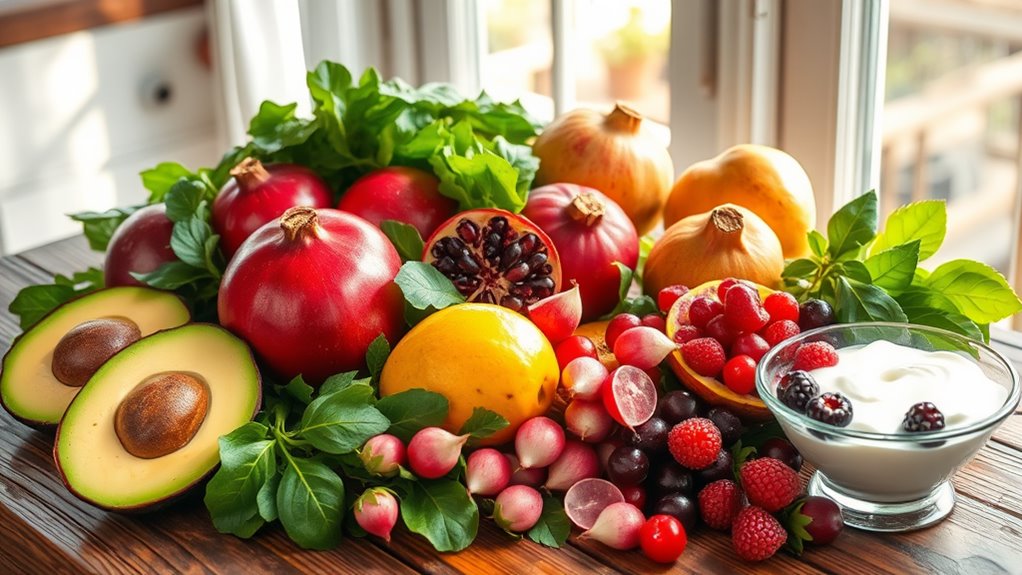The Beauty Diet- What to Eat for a Radiant Look
To achieve a radiant look, you’ll want to focus on essential fatty acids from sources like fatty fish and walnuts, and load up on antioxidant-rich fruits and leafy greens. Don’t forget hydrating foods such as cucumbers and watermelon for a dewy complexion. Incorporate probiotics for skin balance and pay attention to vitamins that promote radiance. Finally, steer clear of refined carbs and processed foods. Keep exploring for more tips on building a balanced beauty diet!
Key Takeaways
- Incorporate omega-3 and omega-6 fatty acids from fatty fish, flaxseeds, and walnuts to enhance skin hydration and barrier function.
- Consume a variety of colorful fruits and vegetables rich in vitamins A, C, and E to promote skin repair and protect against oxidative stress.
- Stay hydrated by eating water-rich foods like cucumbers, watermelon, and strawberries to maintain skin elasticity and prevent fine lines.
- Include probiotic-rich foods such as yogurt and kimchi to balance the skin’s microbiome and reduce inflammation for a clearer complexion.
- Avoid refined carbohydrates, sugary treats, and processed foods to minimize skin inflammation and promote overall skin clarity and health.
Essential Fatty Acids for Glowing Skin
When you think about achieving glowing skin, essential fatty acids should be at the top of your list.
These vital components of your diet for beauty include omega-3 and omega-6 fatty acids, which maintain your skin’s protective barrier and help regulate hydration. You can boost your skin health by incorporating fatty fish like salmon and sardines, along with flaxseeds and walnuts into your meals. Omega-3s not only improve hydration but also reduce inflammation, making them great for conditions like eczema. Omega-3s and omega-6s offer anti-inflammatory and antibacterial properties, which further support the overall health of your skin. Additionally, focusing on beauty nutrition can enhance your overall vitality and appearance.
Don’t forget omega-6s, found in oils like safflower and sunflower, which enhance moisture retention.
Balancing these fatty acids in your diet optimizes skin health, ensuring you achieve that radiant look you desire.
Antioxidant-Rich Foods to Combat Aging
To maintain youthful skin and combat aging, incorporating antioxidant-rich foods into your diet is essential. Berries like blueberries and strawberries protect your skin from oxidative stress and UV damage. Kiwifruit and pomegranates boost collagen production, while cantaloupe and cranberries help keep your skin hydrated and healthy. Leafy greens such as spinach and kale provide crucial nutrients to enhance skin elasticity, including vitamins and minerals that support overall skin health. Don’t forget red peppers and sweet potatoes, which are rich in vitamin C and beta-carotene. Consuming antioxidant-rich diets can help negate the effects of free radicals on your skin. For beverages, green tea offers powerful polyphenols to reduce inflammation. Nuts like almonds and walnuts also contribute healthy fats and antioxidants.
Hydrating Foods for a Dewy Complexion
For achieving a dewy complexion, incorporating hydrating foods into your diet is essential. Fruits like watermelon, strawberries, and peaches are packed with water and crucial nutrients, keeping your skin plump and radiant. Water-rich foods contribute significantly to your hydration needs, ensuring your skin remains healthy and vibrant. Additionally, these fruits are also known for their antioxidant properties, which help protect your skin from damage.
Don’t forget about cucumbers and lettuce; they boast high water content and support hydration. Avocados are fantastic too, as their healthy fats help maintain moisture. Including tomatoes and sweet potatoes boosts your skin’s elasticity and texture. For added benefits, sprinkle chia seeds and almonds on your meals, providing omega-3s and vitamin E.
Finally, consider adding ginger root for its soothing properties. By choosing these hydrating foods, you’ll nourish your skin and enhance your natural glow.
The Importance of Probiotics for Skin Health
Probiotics play an essential role in maintaining healthy skin, as they help balance the skin’s microbiome and reduce inflammation. These live bacteria and yeasts support your skin by alleviating chronic conditions like eczema and acne. By promoting a healthy gut-skin axis, probiotics can enhance skin barrier function and improve hydration, keeping your skin looking vibrant. Additionally, a balanced microbiome can lead to a reduction in acne-causing bacteria, further promoting clearer skin. Incorporating probiotic-rich foods like yogurt, kefir, and kimchi into your diet can greatly benefit your complexion. Moreover, a diet rich in nutrient-rich foods can also support the skin’s health and appearance. Additionally, consider using topical probiotic treatments to further nourish your skin.
Vitamins That Promote Radiance
If you want to achieve radiant skin, focusing on vitamins like C and A is key. Vitamin C boosts collagen production and helps even out your skin tone, while Vitamin A supports cell growth and repair. Vitamin E’s antioxidant properties also play a crucial role in combating oxidative stress, which can enhance your skin’s overall appearance. Incorporating these vitamins into your diet can make a noticeable difference in your complexion. Additionally, consuming a diet rich in nutritious food choices can further support your skin’s health and vibrancy.
Vitamin C Benefits
While many vitamins contribute to skin health, vitamin C stands out for its remarkable ability to promote radiance and liveliness.
This powerhouse antioxidant neutralizes free radicals, shielding your skin from oxidative stress caused by UV rays and pollution. By enhancing your skin’s barrier function, it helps maintain hydration and protects against external stressors.
Plus, vitamin C plays an essential role in collagen production, improving skin firmness and elasticity while reducing fine lines.
On top of that, it inhibits melanin production, effectively fading hyperpigmentation and dark spots for a more even complexion.
To reap these benefits, include vitamin C-rich foods like citrus fruits, strawberries, and bell peppers in your diet, and consider using serums or creams in your skincare routine.
Importance of Vitamin A
Vitamin A is essential for achieving that radiant glow you’ve always wanted, as it plays a crucial role in skin health. This powerful vitamin promotes cell turnover, improving skin texture and reducing fine lines.
Plus, it regulates melanin production, ensuring an even skin tone while combating pigmentation issues. If you’re dealing with acne, vitamin A’s retinoids can help reduce sebum production and fight inflammation.
It also boosts collagen synthesis, which enhances skin elasticity and counters aging. To reap these benefits, include sources like carrots, spinach, and salmon in your diet.
Foods to Avoid for Clear Skin
To achieve clear and radiant skin, it’s crucial to steer clear of certain dietary culprits that can trigger breakouts and inflammation.
First, limit sugary foods and drinks, as they can spike insulin levels and promote acne.
Dairy products often exacerbate skin issues due to hormones that stimulate sebum production.
Processed and high-sodium foods contribute to inflammation and dehydration, negatively affecting your skin’s appearance.
Greasy and fried foods lead to excess oil, increasing breakouts.
Also, avoid refined carbohydrates and high-glycemic options like potatoes that can cause glucose spikes.
Finally, be cautious with chocolate and whey protein, both linked to acne flare-ups in some individuals.
Making these adjustments can help you achieve the clear skin you desire.
Building a Balanced Beauty Diet
To build a balanced beauty diet, you need to focus on essential nutrients that support skin and hair health.
Hydration plays a vital role, so make sure you’re drinking enough water and including hydrating foods in your meals.
Additionally, steer clear of certain foods that can negatively impact your complexion and overall well-being.
Essential Nutrients for Skin
Achieving radiant skin starts with understanding the essential nutrients that fuel its health. Incorporate vitamin A from sweet potatoes and carrots for skin repair, while vitamin C from citrus fruits boosts collagen production.
Don’t forget vitamin E, found in nuts and seeds, to protect against oxidative stress. Vitamin D, obtained from sun exposure and fatty fish, is crucial for overall wellness, and vitamin K in leafy greens helps with clarity.
For minerals, zinc aids in healing, and selenium protects skin cells. Include omega-3 fatty acids from fatty fish to keep skin moisturized.
Finally, antioxidant-rich foods like berries and green tea combat environmental damage. Together, these nutrients build a strong foundation for healthy, glowing skin.
Hydration and Skin Health
While understanding the nutrients that nourish your skin is essential, hydration plays an equally important role in achieving that radiant look. Staying well-hydrated helps your skin maintain elasticity, reducing fine lines and wrinkles.
It also supports your skin’s moisture barrier, preventing dryness and flakiness. Drinking enough water daily—aim for at least eight glasses—ensures your skin looks vibrant and healthy.
Incorporate hydrating foods like cucumbers and watermelon into your diet to boost hydration. Keep an eye on your body’s signals; thirst and dark urine indicate dehydration.
Reducing caffeine and alcohol can further support your hydration goals. Remember, well-hydrated skin aids in recovery and promotes collagen production, essential for that youthful glow you desire.
Foods to Avoid
Avoiding certain foods is essential for building a balanced beauty diet that promotes radiant skin.
Start with refined carbohydrates like white bread, rice, and pasta—they spike insulin levels and fuel acne.
Sugary treats like candy, soda, and ice cream can inflame your skin and lead to breakouts.
Processed and high-sodium foods, including hot dogs and chips, contribute to premature aging and skin issues.
Dairy products may heighten insulin levels for those sensitive to them, while high-histamine foods like bananas and tomatoes can cause redness.
Finally, limit alcohol and fried foods, as they dehydrate and inflame your skin.
Frequently Asked Questions
How Long Does It Take to See Skin Improvements From Dietary Changes?
You might see initial skin improvements within days by cutting out triggers, but significant changes typically take 4-6 weeks due to the skin’s natural regeneration cycle. Consistency in your diet is key for lasting results.
Are There Specific Foods That Worsen Skin Conditions for Everyone?
Imagine your skin as a garden; certain foods act like weeds. While not everyone reacts the same, processed snacks, high-sugar treats, and dairy often worsen skin conditions, causing inflammation and breakouts you’d rather avoid.
Can Supplements Replace Whole Foods for Skin Health Benefits?
Supplements can’t fully replace whole foods for skin health. While they offer targeted nutrients, they lack the thorough benefits and bioavailability that whole foods provide. A balanced diet remains essential for ideal skin nourishment.
How Does Hydration From Beverages Compare to Water-Rich Foods?
Hydration from beverages offers immediate benefits, while water-rich foods provide sustained hydration over time. Both contribute essential nutrients, but you’ll find that combining them enhances overall hydration and health more effectively.
What Role Does Stress Play in Skin Health and Diet?
Did you know that 75% of adults experience stress-related skin issues? Stress can disrupt your skin’s health and lead to poor dietary choices, making it essential to manage stress while maintaining a balanced diet for better skin.
References
- https://newfacechicago.com/blog/nutrient-rich-radiance-top-foods-for-healthy-skin/
- https://zazilha.com/eating-for-radiant-skin-the-ultimate-beauty-nutrition-guide/
- https://www.seacoastdermnh.com/blog/5-foods-that-promote-healthy-radiant-skin
- https://us.thebeautychef.com/blogs/articles/the-beauty-food-diet
- https://www.health.com/best-foods-for-healthy-skin-7963589
- https://vibrantskinbar.com/blog/fatty-acids-for-skin/
- https://glenngoldbergskindr.com/2024/04/05/nourish-your-glow-the-link-between-diet-and-healthy-skin/
- https://bodybio.co.uk/blogs/blog/fatty-acids-for-skin
- https://www.bbcgoodfood.com/health/wellness/eat-your-way-fabulous-skin
- https://www.aveeno.com/journal/breaking-down-omega-3-benefits-skin

